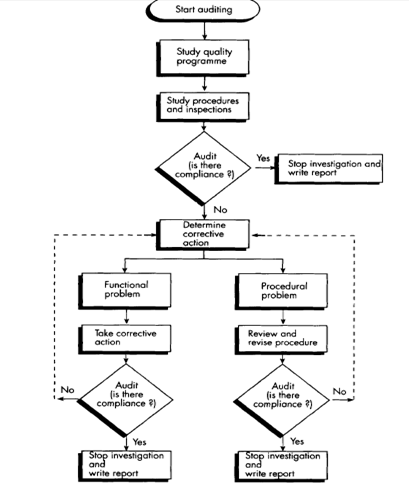SKEDSOFT
Introduction:
The implementation of a good quality assurance system has to be conducted without any time constraints and also has to have the various essential building blocks of climate, readiness, resources and commitment.
Implementation:
- Success in the implementation of quality systems hinges on the professionalism, personality, knowledge, objectiveness and rationality of the auditor.
- In this modern world the implementation of the TQM process is one of the most complex activities that a company can undertake, because it requires cultural change for everybody.
THE QUALITY MANUAL
The quality manual has to be considered as a tool of paramount importance for the implementation of a quality system. It can serve different purposes, some of which are reviewed in the following section:
(i) Describes the task: A quality manual is the ‘proof of the pudding’ as far as quality systems are concerned. It is a transformation of the policy statement into procedures and guidelines for all the activities within the organisation;
(ii) Management decision-making tool: The quality manual, at any time, can provide management with information on various aspects of the organization’s intentions to improve quality in order to meet customer requirements. This information is therefore vital for making accurate and effective decisions;
(iii) Productive workforce: This is perhaps one of the main advantages of having a quality manual. Each worker is provided with guidelines on how to perform their jobs and also given standards which the company is confident that they can achieve. This therefore reduces the learning curve, increases morale and motivates the employees to increase productivity levels;
(iv) Enhances company image: In the eyes of customers, a quality manual illustrates how determined and serious the supplying organisation is about quality and how it is striving to achieve better performance levels for the benefit of the customer. It is also a powerful tool for making suppliers follow the example and conform to the standards of the customers;
(v) Objective performance: A quality manual provides information based on facts and figures and therefore organisations no longer have to depend on subjective input. Bottlenecks are more easily identified and action is taken much more quickly as a result.
THE ROLE OF AUDITING: 
Auditing is an important activity in quality systems to ensure that compliance with set procedures and agreed standards takes place all the time at all stages of the productive/organisational process. As such, auditing can be defined as:
'A planned and documented activity performance in accordance with written procedures and check-lids to verify by investigation, and the examination and evaluation of objective evidence, that applicable elements of a quality programme or plan have been developed, documented and effectively implemented in accordance with specified requirements.
THE PROCESS OF AUDITING QUALITY SYSTEMS:
Basically the routine function is to make sure that the quality manual and procedures are up to date and operating according to specified procedures and standards.